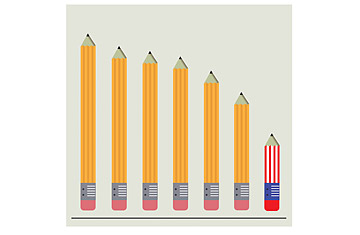
For the past month, we have all marveled at the life of Steve Jobs, the adopted son of working-class parents, who dropped out of college and became one of the great technologists and businessmen of our time. How did he do it? He was, of course, an extraordinary individual, and that explains much of his success, but his environment might also have played a role. Part of the environment was education. And it is worth noting that Jobs got a great secondary education. The school he attended, Homestead High in Cupertino, Calif., was a first-rate public school that gave him a grounding in both the liberal arts and technology. It did the same for Steve Wozniak, the more technically oriented co-founder of Apple Computer, whom Jobs met at that same school.
In 1972, the year Jobs graduated, California's public schools were the envy of the world. They were generally rated the finest in the country, well funded and well run, with excellent teachers. These schools were engines of social mobility that took people like Jobs and Wozniak and gave them an educational grounding that helped them rise.
Today, California's public schools are a disaster, beset by dysfunction and disrepair. They rank at the bottom of the country, just as the U.S. now sits at the bottom of the industrialized world by most measures of educational achievement. The World Economic Forum ranks the U.S.'s educational system 26th in the world, well behind those of countries like Germany, Finland, the Netherlands, Denmark, Canada and Singapore. In science and math, we score even worse.
We've been talking about America's education decline for three decades now, so much so that we are numbed by the discussion. But the consequences of that crisis are only just becoming fully apparent. As American education has collapsed, the median wages of the American worker have stagnated, and social mobility--the beating heart of the American dream--has slowed to a standstill. Education is and always has been the fastest way up the socioeconomic ladder. And the payoff from a good education remains evident even in this weak recovery. The unemployment rate for college graduates is just 4%, but for high school dropouts it is 14%. If you drop out of high school--and the U.S. has a 25% dropout rate--you will have a depressed standard of living for the rest of your life.
The need for better education for most Americans has never been more urgent. While we have been sleeping, the rest of the world has been upgrading its skills. Countries in Europe and Asia have worked hard to increase their college-graduation rates, while the U.S.'s--once the world's highest--has flatlined. Other countries have focused on math and science, while in America degrees have proliferated in "fields" like sports exercise and leisure studies.
Bill Gross, the head of Pimco, the world's largest bond fund, sums it up in no uncertain terms: "Our labor force is too expensive and poorly educated for today's marketplace." There are two variables here: our educational levels, which are low, and our wages, which are high. Either we will raise our educational level or markets will lower our wages.
